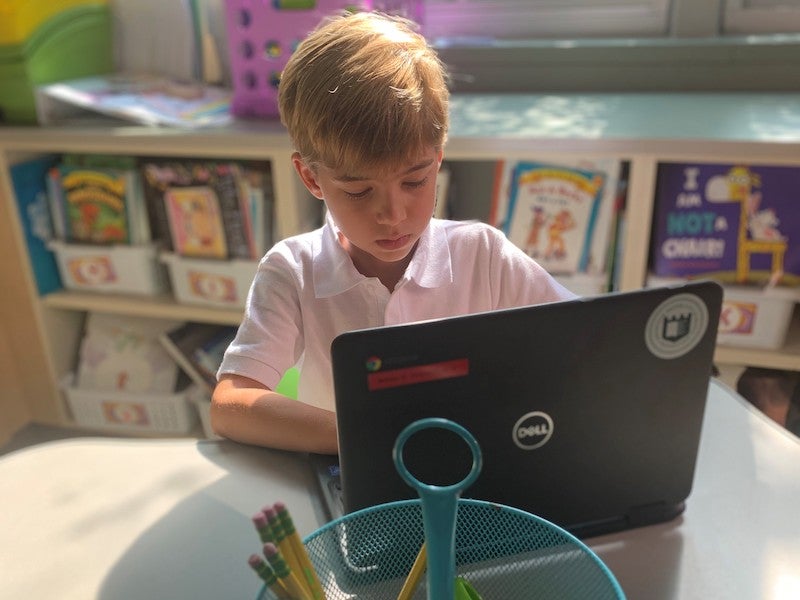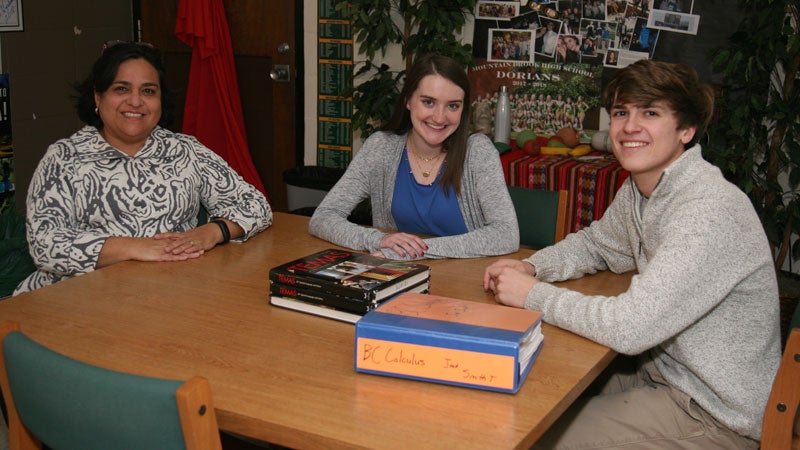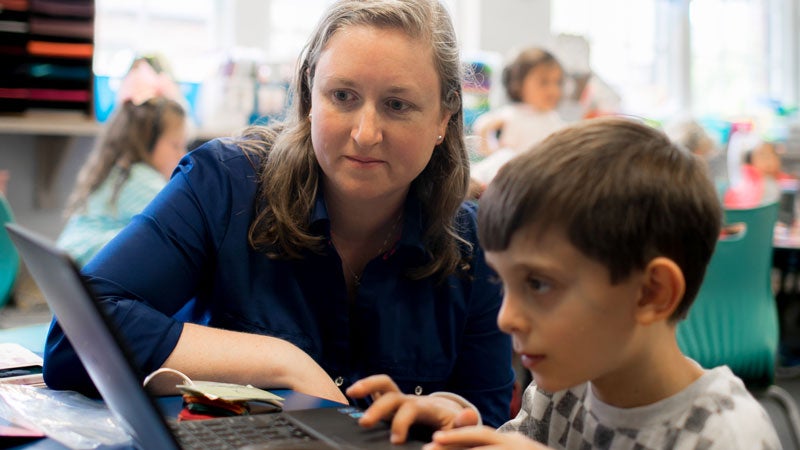By Caroline Newman
Contributed Photos
When the Mountain Brook City Schools Foundation began in 1992, its leaders did not know what the future held, but they wanted to give the Mountain Brook school system as many resources as possible to prepare for that future.
Thirty years later, the foundation has awarded more than $9.3 million in grants to the school system focused on three key areas – technology, teacher support and library enhancements. Its resources support four elementary schools, Mountain Brook Junior High and Mountain Brook High School, supplementing state funding and funds from parent-teacher organizations, which are school-specific.
“The foundation is system-wide and can take a big-picture approach to what can move Mountain Brook Schools forward,” said Executive Director Rachel Weingartner. “The endowment funds can be used in perpetuity and have a long-lasting impact.”
In thirty years, the foundation has steadied the schools through economic ups and downs and even challenges like the COVID-19 pandemic. It has also touched generations of students. Weingartner can already see the future of her work in her three sons, who are or will be students at Crestline Elementary. Key Hudson, president of the foundation’s Board of Directors, attended Mountain Brook schools. Now, her two children are students at Mountain Brook Elementary School.
“My daughter is now the age that I was when the foundation started,” Hudson said. “It is really great, as an alumna, to be able to see the benefits of the foundation while I was there and now to see how the foundation impacts my children every day.”

A Community Comes Together
On April 21, 1992, a Thursday morning, a group of Mountain Brook community leaders led by Dell Brooke and Hatton Smith recorded the first minutes of the “Foundation Steering Committee,” exploring the possibility of a tax-exempt foundation for Mountain Brook Schools. They were concerned about cuts to public education funding in Alabama.
“State funding then and now tends to follow economic cycles. In good years, there would be enough state funding to provide for most of the basics, though not all, and little else. In the down years, it would be a struggle to cover even the basics,” said Charles Mason, who began his 16-year tenure as Mountain Brook School System superintendent in 1993 as the foundation was starting. “The idea behind the foundation was to have a reliable source of funding that would always make it possible for the school system to be forward-looking and focused on improvement.” Such foundations, Mason noted, are relatively rare among U.S. public schools.
By September 1992, the foundation had a Board of Directors led by president Hallett Johnson, who served until 1995. It obtained tax-exempt status in 1993, began fundraising and hired its first executive director, Carmine Jordan, in 1994. By 1996, the foundation was progressing toward its initial goal of $5 million in gifts and pledges over five years and made its first grant, $100,000 focused on professional development and technology. “Sold on Mountain Book” signs began to dot yards across the community, a visible indicator of just how many families were contributing to the growing fund.
Since then, the foundation’s endowment has grown steadily and its structure has solidified. Each year, the superintendent – currently Dr. Dicky Barlow – comes to the foundation’s board with requests based on the system’s budget and needs. Some are recurring, such as professional development stipends for teachers and an annual summer learning conference. Others support new technology or ideas, such as a recent grant for OverDrive, an app allowing students to access eBooks from local libraries.
“So much in the school system budget is spoken for, but the foundation gives teachers and administrators room to try new things and innovate to see what is best for our students and teachers,” Hudson said. “That is one thing that gets me really excited about the foundation.”
“What the foundation has done for the school system is nothing less than spectacular. Through the foundation’s contributions, we have been able to continue quality professional development through the lean times. It has allowed us to be innovative and on the cutting edge throughout its 30-year history,” Barlow said. “We would not be the school system we are today without the foundation’s contributions and guidance.”

Support for Teachers’ New Ideas
The school system’s Institute for Innovation, which is funded by the foundation, was created in 2014 to provide annual grants for projects like Morgan Chatham’s.
Chatham, a Mountain Brook High School mathematics teacher called Mrs. C. by her students,
wanted to create an immersive classroom after seeing Spanish teacher Jessie Creech simulate a café in her classroom to encourage students’ conversations. Math might not lend itself to a café setting, but Chatham envisioned a room full of whiteboards and projectors where students could get out of their seats and solve problems together.
“I wanted to get my kids out of their seats, mobile and activating different muscle groups, writing, talking, collaborating,” she said.
In 2017, Barlow requested funding from the Institute for Innovation for three walls of six-foot boards so that Chatham could test her plan. The next school year, the boards were up and Chatham was thrilled.
“They were all getting up, working through problems and having amazing mathematical conversations,” she said. “If someone asked me for help and I was with another student, someone else would step up, working out the problem with their classmate. They all felt empowered to help each other.”
Other teachers took notice and soon, every high school math teacher could request a similar setup.
The support for her idea, especially as a relatively new teacher with five years of experience when she made the request, meant a lot.
“I did not know a lot about the foundation when I first applied to this job,” said Chatham, now in her tenth year with Mountain Brook. “But since then, I will shout from the rooftops how grateful I am for the foundation. To know that they listened to my idea, thought it was valuable, and trusted me to run with it, that is just an incredible indication of support.”
For Mason, the foundation’s focus on professional development has been critical to its success. He also believes it spurred other area school systems to increase their own professional development offerings, further benefiting Birmingham teachers.
“Teachers are the key,” Mason said. “It is so important for them to always have opportunities to learn, from each other and others, so that the school system can sustain improvement year after year.”

Ready for an Unprecedented Moment
When the foundation began in 1992, personal computers were just becoming ubiquitous and many early projects focused on bringing new technology into schools. By 2015, the foundation was supplementing costs for Chromebooks for every student, starting with high school students and eventually encompassing junior high and elementary students, and for teachers.
Those Chromebooks proved crucial when the COVID-19 pandemic hit in 2020 and abruptly forced schools to transition from in-person learning to online, at-home learning.
Led by Director of Technology Suzan Brandt and her team, the school system quickly assigned students laptops to take home. They used a program called ClassLink to get lessons to students and set up a helpline. Supply chain problems were not an issue with the computers in hand. The software students needed was already loaded and ready for them to log on, and Google Meet video connections, also funded by the foundation, were ready to go.
“We had enough in place to get that program off the ground quickly with minimal disruption to learning,” Brandt said. “COVID itself was quite a shift, of course, but we were fortunate to have those devices already and we made it happen.”
The foundation approved an additional $300,000 in grants in response to COVID, giving a record $761,843 in 2020-21. The school system used the funds to purchase technology for distance learning and fund licenses for software platforms like Eduvision and Google Enterprise.
“COVID certainly was not easy, it was still a painful experience for everyone,” Hudson said. “But having the Chromebooks already, and having them all operate on one system that was already in place, did make the transition easier.”
Now, Hudson said, foundation leaders, are ready to make the next 30 years just as successful, no matter what challenges come up.
“We are focused on providing continued support for our students and teachers to make learning more engaging, and working to support the school system for the next 30 years.”











